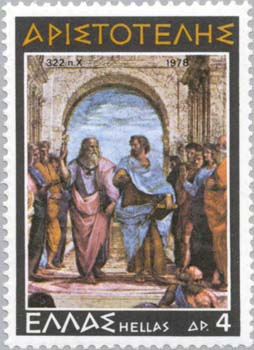|
|
Aristotle Translated by W. D. Ross
Plato (left) with Aristotle (right) who stretches his hand (School of Athens). For Aristotle there are no abstract classes of objects, Platonic Forms or ideals. He holds a copy of his Nichomachean Ethics -- and he indicates with his gesture the worldliness, the concreteness, of his contributions to philosophy. Nicomachus was the father of Aristotle but also his son was called Nicomachus (the mother some say was Herpyllis a concubine of Aristotle which he married after the death of his wife Pythias). His brown and blue colored clothes probably represent the two elements water and earth (probably to show that his philosophy is grounded, material), whereas Plato's two colors represent fire and air Content Book II - Virtue, Moderation and the Mean II (6-7) Lecture on Aristotle's Nicomachaean Ethics, Ian Johnston Comments about the Nicomachean Ethics Aristotle's Ethics at Stanford Encyclopedia of Philosophy (http://plato.stanford.edu/entries/aristotle-ethics/) Perseus Texts Nicomachean Ethics
 |
|
||||||||||||||
